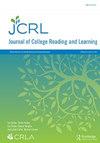An Afrofuturistic Vehicle for Literacy Instruction
Q2 Social Sciences
引用次数: 9
Abstract
Afrofuturism is a storytelling genre that appears in multiple media types, including books, films, television, comics, music, and art. Drawing from genres such as science-fiction, fantasy, horror, magical realism, and other speculative genres, Afrofuturism re-envisions the past, present, and future in order to show what the Black community does and can look like in imaginative and yet intensely real ways. Afrofuturism challenges its audiences’ ideas about race, gender, science, and technology, as well as those audiences’ assumptions about the past and expectations about the future. The fluid nature of Afrofuturism makes it difficult to define, but this fluidity allows for compositional flexibility and playfulness. Afrofuturism explore issues that also defy borders and definition, such as disability, sexuality, and gender. After surveying Afrofuturist works across media types, I found that Afrofuturism provides a rich resource for college literacy instruction, especially the teaching of composition and rhetoric. I argue that professors can incorporate Afrofuturism in their classrooms to create learning spaces in which all their students can practice thinking and writing more critically and fluidly, but also highlight how Black people have been and are creators of knowledge and stewards of literacy. Additionally, I provide pedagogical examples of how to incorporate Afrofuturism into the classroom beyond inclusion in the reading list.一种非未来主义的识字教育工具
非洲未来主义是一种叙事类型,出现在多种媒体类型中,包括书籍、电影、电视、漫画、音乐和艺术。从科幻小说、奇幻小说、恐怖小说、魔幻现实主义和其他投机类型中汲取灵感,非洲未来主义重新设想了过去、现在和未来,以富有想象力但又非常真实的方式展示了黑人社区的所作所为和样子。非洲未来主义挑战了观众对种族、性别、科学和技术的看法,也挑战了观众对过去的假设和对未来的期望。非洲未来主义的流动性使其难以定义,但这种流动性允许构图的灵活性和趣味性。非洲未来主义探索的问题也不受边界和定义的限制,比如残疾、性和性别。在调查了跨媒体类型的非洲未来主义作品后,我发现非洲未来主义为大学素养教学提供了丰富的资源,尤其是作文和修辞教学。我认为,教授们可以将非洲未来主义融入课堂,创造学习空间,让所有学生都能在其中更批判性、更流畅地练习思考和写作,同时也要强调黑人过去和现在都是知识的创造者和读写能力的管理者。此外,我还提供了一些教学实例,说明如何将非洲未来主义融入课堂,而不仅仅是在阅读清单中。
本文章由计算机程序翻译,如有差异,请以英文原文为准。
求助全文
约1分钟内获得全文
求助全文
来源期刊

Journal of College Reading and Learning
Social Sciences-Linguistics and Language
CiteScore
1.60
自引率
0.00%
发文量
23
期刊介绍:
The Journal of College Reading and Learning (JCRL) invites authors to submit their scholarly research for publication. JCRL is an international forum for the publication of high-quality articles on theory, research, and policy related to areas of developmental education, postsecondary literacy instruction, and learning assistance at the postsecondary level. JCRL is published triannually in the spring, summer, and fall for the College Reading and Learning Association (CRLA). In addition to publishing investigations of the reading, writing, thinking, and studying of college learners, JCRL seeks manuscripts with a college focus on the following topics: effective teaching for struggling learners, learning through new technologies and texts, learning support for culturally and linguistically diverse student populations, and program evaluations of developmental and learning assistance instructional models.
 求助内容:
求助内容: 应助结果提醒方式:
应助结果提醒方式:


